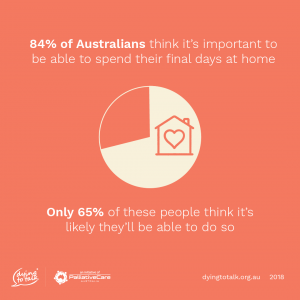Understanding palliative care
Like other areas of the medical industry, discussions around palliative care have led to controversy. It has often been asked why an approach, or service needs to exist for caring for the terminally ill, when similar services are already offered by other medical professionals, such as hospital hospices.
This controversy has worsened in Australia over the past few years as the topic of euthanasia has become highly discussed.
Currently in Australia, euthanasia is illegal in all States except Victoria. In 2017, the Victorian Government agreed to legalise euthanasia in 2019 for patients suffering immense pain. As euthanasia allows a patient suffering from an incurable or painful disease to end their life, it is argued whether palliative care is also necessary.
So, what is palliative care and why is it important? Here is what you need to know.
What is palliative care?
In simplest terms, palliative care allows patients and their families to live as comfortably as possible while facing severe medical problems (for example, those associated with life-threatening illnesses).
Features of palliative care can include:
- Resources, such as equipment needed to aid care at home
- Assistance for families to come together and discuss sensitive issues
- Links to other services, such as home help and financial support
- Support for emotional, social and spiritual concerns
- Counselling and grief support
- Referrals to respite care services.
Why is palliative care important?
There are many important factors to palliative care including care planning and advanced care. Though, possibly the most important part is the available support.
Whether it be by preventing, diagnosing or treating symptoms, the service aims to help patients make important decisions and feel comfortable.
As nurses and doctors are available, they help sufferers overcome obstacles and can provide medication, assist with sanitary or hygiene needs and offer daily transport.
Not only does it help patients, it also provides support for families struggling to take care of sick loved ones by easing their concerns regarding treatment. It also takes pressure off families, so loved ones can enjoy their final moments with those under palliative care.
When is it time to enter palliative care?
Palliative care is for anyone suffering from a life-threatening illness or disease who needs assistance in everyday life, including emotional, physical, social or spiritual support.
Access to palliative care is for those with incurable diseases such as:
- Cancer
- Liver failure
- Kidney failure
- Huntington’s disease
- Lung disease
- Advanced heart disease
- HIV/Aids
Palliative care staff
There are many medical and trained professionals available, all covering a broad spectrum of roles to care for palliative care patients.
These professions include:
- Doctors
- Nurses
- Social workers
- Physiotherapists
- Occupational therapists
- Speech therapists
- Psychologists
- Trained volunteers.
There is also an option for patients to elect their friends and family as a palliative carer. This can be comforting to patients as they may prefer going through their final stages of life being cared for by someone familiar to them.
Palliative Care Week
Each year, there is a National Palliative Care Week designed to raise awareness. It is organised by Palliative Care Australia. This year it was held from 20 – 26 May with the theme ‘What matters most?’ which addressed the need for Australians to plan for their end-of-life care and discuss their plans with loved ones and/or health professionals.
There are many ways you can be involved in National Palliative Care Week, including:
- Make a one-off tax-deductible donation to Palliative Care Australia
- Become a Palliative Care Australia corporate partner and align your brand with this very worthy cause
- Share your personal story about palliative care
- Raise funds for Palliative Care Australia by organising an event such as a fun run, golf day, charity auction or trivia night
- Become a Palliative Care Australia volunteer and assist with admin support, fundraising or marketing
- Ask for donations to Palliative Care Australia in lieu of gifts for your birthday, Christmas, wedding or anniversary
- Spread the message about palliative care on Facebook, Twitter and your other social media platforms.


Frequently Asked Questions
Is palliative care covered by Medicare?
- For both Medicare and private health insurance policy holders, there are palliative care options available for public and private hospitals. Along with this, the Australian Government introduced a National Palliative Care Strategy in 2010. When devising the strategy, there were four main goal areas in consideration. These are:
– Awareness and understanding – in order to improve the appreciation of death as a normal part of life, the strategy has aimed to boost awareness and the benefits of palliative care.
– Appropriateness and effectiveness – a clear need in palliative care is appropriateness and effectiveness, therefore the Government has looked at how to better these two factors.
– Leadership and governance – the leadership of available palliative care is imperative to ensuring there is collaborative and proactive programs in place.
– Capacity and capability – lastly, to build the capacity of all sectors in the relevant services, quality palliative care is needed. - What is specialist palliative care?
Simply, specialist palliative care is delivered by a team of trained professionals (for example doctors and nurses) and is essential for patients to provide high quality care. - Where is palliative care provided?
While some may think palliative care is only available at home, there are many other places it can be provided. Examples include:
– Residential care facilities – for many people, a residential care facility is considered a home and therefore any patient living in these facilities can receive all palliative care services. Local palliative care services are also able to provide advice or support to workers in residential facilities, so the patient is receiving the best care.
– Inpatient care, hospital – there are many hospitals across Australia which accept or even have their own palliative care units providing care. Inpatient care can allow professionals to discuss with patients how they are managing at home and suggest any recommendations. If considering this option, make sure to contact your local hospital for further information. - What is Advance Care Planning (ACP?)
- An important part of palliative care is ACP, which is writing down, thinking or discussing your wishes regarding care in case you are ever unable to speak for yourself because of illness, injury etc.
- What is Liverpool Care Pathway (LCP)?
LCP focuses on an end-of-life pathway including bedside care to improve the final hours or days of a patient’s life. The main goal of this pathway is to look at aspects including comfort measures and psychological or spiritual care. It also looks into the discontinuation of any inappropriate interventions or medications. Not only this, the care of the family is focused on both before and after the death of the patient.
Written by Home Doctor Brisbane Team






